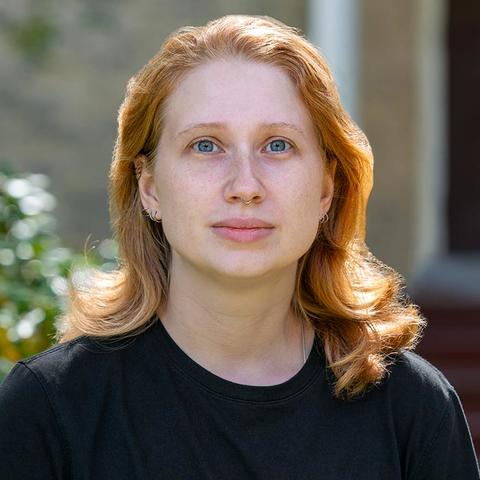Writing Center
Multilingual Students
The Haverford Writing Center values all languages and language varieties, embraces linguistic diversity and linguistic justice, and is committed to working with multilingual writers and speakers.
Many tutors on our staff are multilingual speakers and writers who understand both the challenges and advantages of being multilingual. Haverford enrolls both international and US-based students who are writers and speakers of two or more languages. In recent years, Writing Center clients have included speakers of Amharic, Arabic, Bengali, Cantonese, Czech, French, German, Gujarati, Haitian Creole, Hebrew, Hindi, Japanese, Kinyarwanda, Korean, Luhya, Malayalam, Mandarin, Nepali, Portuguese, Punjabi, Russian, Shona, Slovak, Spanish, Swahili, Thai, Ukrainian, Urdu, Uzbek, and Vietnamese.
Multilingual Specialist
Faculty Tutor and Multilingual Specialist Marigold Stratford (they/them) works closely with many multilingual students. Marigold received their B.A. in French Studies with a minor in Russian studies and certificate in translation from American University, and their MFA in Creative Writing from University of Arkansas. They have taught English language and academic writing to multilingual students in Washington D.C.; Baku, Azerbaijan; Fayetteville, Arkansas; and Ales, France. They bring a passion for language, literature, and linguistic justice to their work at the Writing Center.
Linguistic Justice and the Writing Center
The Haverford Writing Center is committed to linguistic justice and linguistic rights. As a Writing Center, we are dedicated to serving our students and peers and providing them with the tools and resources necessary for their voices to be heard. These voices speak, write, and sign in a plethora of different languages, all equally-deserving to be heard, but not all treated equally in society.
Haverford College is a site of many languages and language varieties, including varieties of English. These languages and language varieties are equally capable of effectively communicating our thoughts; there is no “bad” English or “better” language, and any such ideologies that we may hold, for example that White Mainstream English (also known as Standard English) is better than Black English, are false ideologies based on hegemonic social structures. They are often reflections of beliefs people hold about those who speak the languages, rather than the languages themselves. Instead of perpetuating false ideologies—and therefore structures of oppression—the Haverford Writing Center is dedicated to actively working against our personal and institutional biases and to promote the speaking and writing of any and all languages and language varieties.
The languages people speak cannot be separated from those who speak them; language is an important part of identity and expression of self. When we place one language above others and prevent people from using or feeling comfortable enough to use their language, that is equivalent to silencing and erasing those people’s identities. However, any speaker of a language is an expert in that language, and there are countless varieties of languages, writing styles, and essay structures, all of which are and ought to be equally valuable. This includes minority languages such as Black Language, any of the countless World Englishes, and non-English languages spoken across the globe.
The dominant variety of English used in campus academic settings is a language that has been raised above others in society. It is a tool of oppression, and a form of racial (and class) violence. The Writing Center is a part of Haverford, a primarily white academic institution. As Writing Center tutors, we play a unique role in influencing the work of our peers within this institution, and as such are often seen as authorities on “good” and “bad” writing. However, this authority comes from privilege that is often used to keep academia inaccessible to those not born into this privilege. It is thus important for the Writing Center to actively use our position of authority to disrupt the structures of power and privilege that prevent our peers from accessing academia—as well as the (same) structures that define success based on whiteness and White Mainstream (Academic) English.
We understand that this work is not easy, nor can the problems in our community be addressed by a single action or a statement of support. This work is and must be ongoing, ever-changing and improving, and cannot be limited to the Writing Center. Still, as members of an institution, it is important that we Writing Center tutors and staff do our due diligence in improving the community we are a part of and striving for social and linguistic justice.
—Nuria Benitez ‘22
